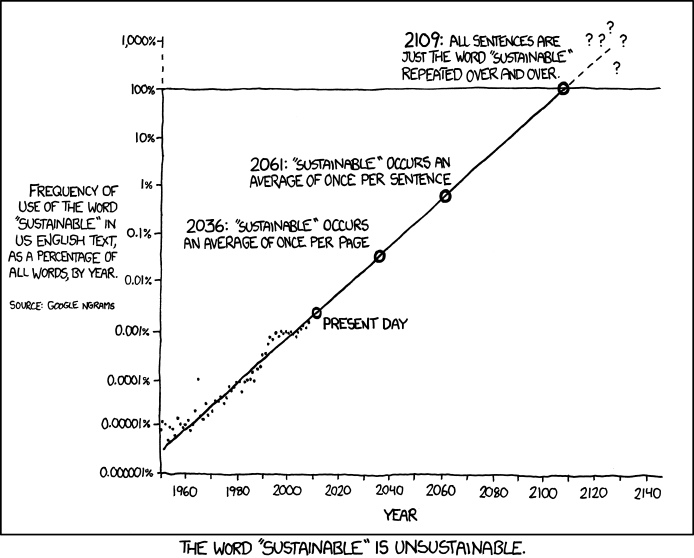I recently saw a tongue-in-cheek graph that predicted that in about a hundred years, all sentences would be one word sentences and that word would be “sustainable.” The irony, of course, is that that maintaining the rate at which the word “sustainable” is used is unsustainable. The graph was created by the folks at xkcd.com.

A year ago, Lesley Lammers wrote, “Advertising Age named sustainability one of the ‘jargoniest jargon’ words of 2010 that they ‘wish you would stop saying,’ right up there with monetize, choiceful, and the new normal, among others.” [“Sustainability Named One of ‘Jargoniest Jargon’ Words of 2010 by Ad Age,” Triple Pundit, 5 January 2011] The editorial staff at The Green Supply Chain point out that over the past few years “consumer packaged goods companies [have] launched a flurry of Green-oriented products, and spent heavily on advertising to promote them.” Despite these efforts, however, the staff reports that consumer interest in green products has not kept pace. [“Consumer Interest in Green Products Still Tepid, Headed Down,” GreenSCM, 27 April 2011] The article states, “In 2011, … the promise of Green consumer products have dimmed, either due to the impact of the severe economic downturn, or an overestimation of just what sorts of Green choices consumers might make.” As I have pointed out before, price trumps ideology all the time. The article continues:
“A new report from OgilvyEarth, a division of the advertising giant, found that that 82% of Americans have good Green intentions but only 16% are dedicated to fulfilling these intentions, putting 66% of consumer firmly in what Olilvy calls the ‘Middle Green.’ It says that ‘most of the dialogue and marketing to date has focused on Super Greens on the one hand and Green Rejecters on the other. There has been limited success in motivating the masses or the Middle Green.’ While consumer price isn’t the only factor in this Green gap, it is an important one, according to Olgilvy.”
Robert J. Bowman, managing editor of SupplyChainBrain, openly wonders business executives are really any more committed to sustainability than consumers. [“Does Global Business Really Care About Sustainability?” 3 January 2012] He writes:
“It’s easy for a top executive who’s concerned about corporate image to profess a solid commitment to sustainability. When it comes to gauging actual progress toward that goal, however, the reality is one of mixed messages. A study by Accenture, released in the spring of 2011, highlights the dilemma. The firm reached out to 247 C-suite executives in the U.S., U.K. and China. Ninety-three percent said they had sustainability initiatives in place. Seventy-two percent declared that the benefits from those efforts – in the form of enhanced corporate reputation and trust, lower cost and improved brands – had exceeded expectations. And 68 percent viewed sustainability as an integral part of their business. Seems like a pretty encouraging picture, but being a glass-half-empty kind of guy, I need to point out that a solid one-third of respondents to the Accenture survey saw sustainability as peripheral to their operations. Slightly more, 34 percent, considered it more of a cost than an investment, and 28 percent believed their companies were already spending too much in that area.”
Even among companies that embrace sustainability efforts, only two-thirds believe that such efforts help boost profits. [“Sustainable Gain?” CFO Magazine, 1 May 2011] Those findings came from a survey published by MIT’s Sloan Management Review. The study asserts that “Embracers”: “(1) have created a business case for sustainability; (2) believe sustainability is necessary to be competitive; and (3) have made it a permanent part of the management agenda.” I think that the most important characteristic that separates embracers from other companies is the fact that they have a business case for their sustainability efforts. One of the most interesting things the study revealed is that the Africa/Middle East region is home to more “embracers” than any other global region. The Sloan study indicated that fewer than 4 percent of companies could be called “true sustainability skeptics.” Bowman continues:
“Cost continues to be the biggest barrier to achieving corporate sustainability, as specified by 41 percent of the respondents [in the Accenture study]. Other obstacles cited included an inability to measure the results of sustainability initiatives (31 percent), lack of government incentives (30 percent), and a belief that one company can’t make much of a difference in the effort to combat global warming (29 percent).”
I believe few companies adopt sustainable practices solely based on the idea that they are going to have an impact on global warming. Even so, the number might have been higher if the question had referred to climate change rather than global warming. The latter term continues to generate heated debate. Bowman continues:
“Turn now to a more positive study, this one by BSR, a global network of more than 250 businesses dedicated to implementing corporate policies that promote sustainability, accountability and human rights. Conducted in tandem with the research consultancy GlobeScan, the survey polled 498 executives from more two-thirds of BSR’s member companies. Eighty-four percent said they were optimistic that global businesses would embrace sustainability and corporate social responsibility as part of their core strategies within the next five years. Commented BSR president and chief executive officer Aron Cramer: ‘Recession or not, it seems very clear that companies are maintaining if not extending their commitments to sustainability.’ Positive signs include the rise of the chief sustainability officer and increasing attention being paid to the topic by corporate boards.”
Although better PR may be responsible for increased C-level attention, more and more boards and stockholders are concerned about the potential impacts that climate change and resource shortages could have on the bottom line. To learn more, read my post entitled Supply Chain Risk Management and Climate Change. Bowman continues:
“Speaking at a press conference at BSR’s annual conference in San Francisco, Cramer said companies are realizing that sustainability has intrinsic value. They are coming to see it as ‘one way to future-proof their strategies.’ … BSR’s portrait wasn’t all roses. It identified a serious shortfall in efforts to integrate sustainability into core business functions. More than two-thirds of respondents said their corporate communications and public affairs departments were the most engaged functions in sustainability and CSR. (No surprise there – what else are corporate communications and public affairs for? Can you say ‘greenwashing’?) But the numbers slide precipitously when it comes to areas such as marketing (42 percent), research and development (41 percent), human resources (37 percent) and finance (18 percent). In fact, the biggest surprise to the 2011 study’s authors was ‘the level of engagement of sustainability across the enterprise and how little connectivity there is,’ said GlobeScan senior vice president Chris Coulter. ‘The disconnection is really a challenge.'”
The aforementioned disconnection also highlights the fact that corporate silos are alive and well — and continuing to prevent companies from achieving better corporate alignment. Bowman continues:
“Former Vice President Al Gore, now the world’s most high-profile cheerleader in the fight to reverse global warming, was the BSR conference’s keynote speaker. He said efforts by CEOs to integrate sustainability into their operations have become ‘a global movement.’ At the same time, he acknowledged a persistent tendency by companies to focus on the short term. Investors are the chief culprits, pressuring businesses to show ever-rising profits on a quarter-to-quarter basis. Such a mentality, Gore said, ‘is a terribly debilitating force in the market.’ Demands from the investment community supply a ‘constant headwind’ for executives struggling to look beyond the next reporting period. So we’re faced with plenty of good intentions, some progress and an institutional aversion to the kind of long-term thinking that is crucial to the success of any corporate sustainability effort.”
I suspect that the former Vice President’s assertion that CEOs are creating a global movement towards sustainability may be overstated. At the least the numbers reported in the studies above don’t support such hyperbolic characterizations. As I noted earlier, what I think is growing is C-level awareness that global supply chains are going to continue to be disrupted by climate-related events. That doesn’t make those executives environmentalists — just realists. Bowman concludes:
“BSR seems to feel that [aversion to long-term thinking] is changing rather quickly. And Gore’s message was positive on balance, even though he continues to deride the kind of ‘magical thinking’ that denies the reality of global warming. It would appear that true progress toward sustainable supply chains won’t be made until all businesses come to see the issue not solely as one of corporate beneficence but of self-interest. Considering the positive impact of efforts such as economizing on fuel, cutting back on packaging, shortening supply lines and making better use of finite resources, that should be an easy case to make.”
While I agree that “sustainable” and “sustainability” may be overhyped and overused words, good business practices that fall under the sustainability heading nevertheless remain good business practices — hype or no hype. The Consumer Goods Forum (CGF) believes that sustainability is so important that it identifies it as one of its “five strategic priorities.” The Forum’s other strategic priorities are: Emerging Trends, Safety & Health, Operational Excellence, and Knowledge Sharing & People Development.
The editorial staff at SupplyChainBrain (SCB) reports that the CGF has published a Glossary of sustainability terms that “provides a common way for companies across the industry to communicate among each other and to consumers using commonly defined and understood terms such as ‘Life Cycle Assessment’, ‘Sustainable Sourcing’, ‘Natural Refrigerants’, and ‘Recyclable’.” [“Glossary for Sustainability Terminology Introduced for Consumer Goods Industry,” 26 January 2012] Gavin Neath, senior vice president of sustainability for Unilever, told the SCB staff, “Until now, a common, well-defined lexicon of environmental sustainability terms has been lacking. The release of ‘The Glossary’ bridges that gap, and is an important step forward for our industry.” The glossary can be accessed using this link.
I have insisted all along that the only sustainability efforts that will prove to have legs will be those driven by enlightened self-interest. If a business case can’t be made, idealism will not be sufficient motivation to continue such activities. In the long run, that’s okay. Without a business case, sustainability efforts are like going on a fad diet to lose a few pounds. Those pounds won’t stay off unless you make a life-style change, not just a temporary effort to reduce food intake for a few weeks. Sustainability efforts can’t be peripheral to the business they must be an integrated part of the business. Bottom line: They won’t be integrated into the business unless a business case can be made for them.




